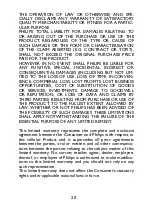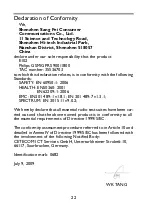
13
radio wave technology, including the GSM technology, has been re-
viewed and safety standards have been drawn up to ensure protec-
tion from exposure to radio wave energy. Your cellular telephone
complies with all applicable safety standards
and the Radio Equipment and Telecommunications Terminal Equip-
ment Directive 1999/5/EC.
Always switch off your phone...
Inadequately protected or
sensitive electronic equipment
may
be affected by radio energy. This interference can lead to accidents.
Before boarding an
aircraft
and/or when packing the
phone in your luggage: the use of mobile phones in an
aircraft may be dangerous for the operation of the air-
craft, disrupt the mobile phones network and may be
illegal.
In
hospitals
, clinics, other health care centres and any-
where else where you may be in the close vicinity of
med-
ical equipment
.
In areas with a potentially
explosive atmosphere
(e.g.
petrol stations and also areas where the air contains dust
particles, such as metal powders).
In a vehicle transporting flammable products (even if the
vehicle is parked) or a vehicle powered by liquefied petro-
leum gas (LPG), check first that the vehicle complies with
the applicable safety rules.
In areas where you are requested to turn off radio transmitting de-
vices, such as quarries or other areas where blasting operations are
in progress.
Check with the vehicle manufacturer that
electronic equip-
ment
used in your vehicle will not be affected by radio ener-
gy.
Pacemakers
If you have a
pacemaker
:
• Always keep the phone more than 15 cm from your pacemaker
when the phone is switched on, in order to avoid potential in-
terference.
• Do not carry the phone in a breastpocket.








































